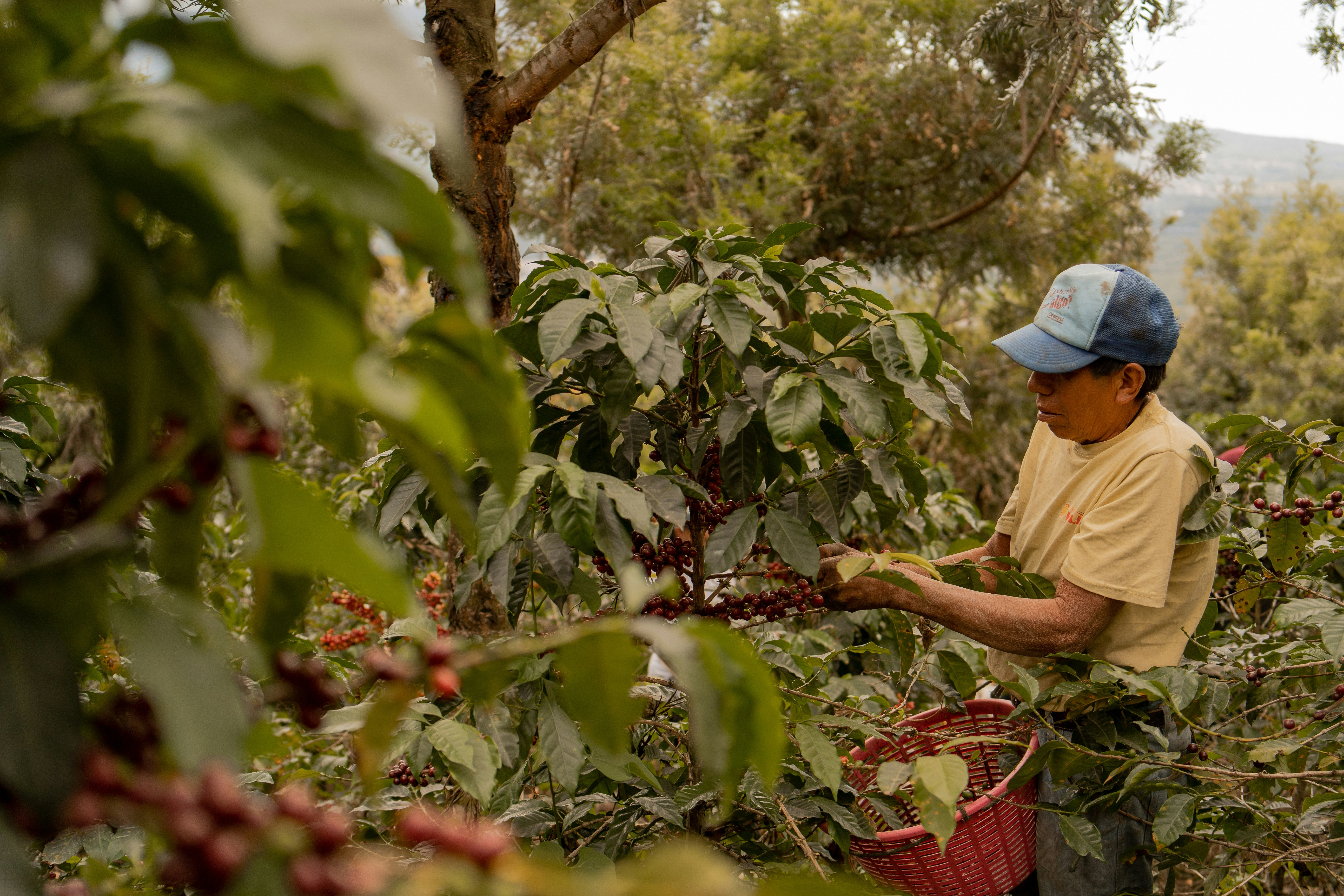Reading Time: 5min

¡Lee este artículo en español! 🗨️🇪🇸
Planet2050 is thrilled to announce a strategic partnership with the Coffee Impact Collective to enable a new era of high-quality environmental assets within the coffee and cocoa value chains.
We firmly believe that novel insetting approaches as well as carbon and nature-based crediting schemes can help unlock the financial incentives required to protect ecosystems and contribute to much-needed climate mitigation actions to meet 2050 targets and beyond.
Leveraging each other’s complementary strengths, Planet2050 and the Coffee Impact Collective will announce the Regenerative Coffee Program in Colombia during the COP16 on Biodiversity in Cali taking place from Oct 21 to Nov 1, 2024.
Did you know that by 2050, up to 50% of land suitable for growing coffee may be lost due to climate change's negative impacts!
According to the Intergovernmental Panel on Climate Change (IPCC) sixth assessment report, perennial crops such as coffee are “particularly vulnerable” to impacts such as climate variability and pests.
Colombia itself has lost 20% of cultivated land for coffee since 1990 and it is estimated that Brazil, the largest coffee producer in the world could lose up to 80% of land by 2050. Cocoa, cashew, avocado and many other food commodities are also at risk.
Globally, 120 million people worldwide depend on coffee for their livelihoods, 95% of which are smallholder farmers. Around 60% of coffee worldwide is produced on farms covering less than five hectares. These farmers live in financial instability and are at risk of discontinuing production and lose their cultural and natural heritage.
To address these critical issues, solutions are emerging to re-build resilience at farms, by introducing regenerative agriculture practices like shading trees, improved water practices, or turning coffee husks and other biomass residues into biochar-based fertilizers.
Indeed, most farms located in highly biodiverse ecosystems so there is an enormous opportunity to channel additional revenues to farmers as a reward for their vital ecosystem stewardship.
However, access to carbon markets remains extremely difficult for most smallholder farms. Likewise, the biodiversity markets are difficult to access.
Whilst very promising, these markets are still nascent and need to develop standardization as well as awareness among buyer segments across the board.

Increasingly, coffee buyers are realizing that they need to make strategic investments to guarantee long-term supply especially in the context of year-on-year growing demand which is projected at 5.4% for 2024–32 (The Global Coffee Market).
Coffee buyers are feeling the pressure from regulators and consumers alike to ensure their value chains are sustainable and future-proof, especially with the European Corporate Sustainability Reporting Directive (CSRD), Due Diligence Directive (CSDDD) or the Deforestation Regulation (EUDR). In response to market pressures, actors in the coffee industry are now exploring holistic strategies to reduce their value chains carbon and environmental footprint.
Where are coffee emissions coming from?
Research shows that 40-80% of emissions for coffee importers, roasteries and brands are related to fertiliser use and other emission sources at the farm level. Another research has found that switching to sustainable coffee-growing could reduce emissions by 75%.
Insetting solution for Coffee Buyers
Planet2050 and the Coffee Impact Collective are offering Coffee Buyers the opportunity to act on them own value chain emissions through a dedicated insetting platform connecting stakeholders working together towards the shared goal of protecting smallholder coffee production, natural local ecosystems and community wellbeing.
Corporates in the coffee sector can therefore make a significant contribution towards nature conservation and regeneration through more ambitious mechanisms which go beyond carbon inventories and reporting.
The initiative aims to launch selected pilots to develop regenerative coffee value chains starting in Colombia:
On the demand side, by driving the adoption of environmental credits and establishing insetting best practices in coffee supply chains among buyers and multinationals.
On the supply side, by developing innovative ways to improve land resilience and the livelihood of coffee farmers through agroforestry practices and access to the carbon and biodiversity global markets. We provide finance to small farmers in order to incentivise their transition, derisk their investments and increase their resilience to droughts, temperature changes and other climate events. Baseline studies will be carried out at farm level where project activities will be context-based.
Solutions include:
Introducing trees and shrubs with coffee plants to bring back shade and biodiversity
Producing biochar from coffee processing residues which can be applied back into soils for fertility and water retention
Improving overall water irrigation and retention systems
Monitoring biodiversity indicators such as wildlife sightings in specific coffee ecosystems
This important world biodiversity conference,COP16, will focus on the implementation of the Biodiversity Plan (i.e. the Global Biodiversity Framework #GBF). This framework, signed by 196 countries and adopted in December 2022, seeks to protect 30% of the world's terrestrial and marine areas by 2030 and mobilize $200 billion per year by 2030 to support biodiversity efforts.

In the words of Susana Muhamad, Colombian Minister of Environment and Sustainable Development, and Chair of #COP16:
"The real fight of the 21st century is for life. If we succeed in transforming our relationship with nature, as well as our production and consumption practices, then we will be addressing the most important challenges of our time"
Launch of the Peace with Nature Coalition: integrating countries to drive the regeneration of life and reverse the climate crisis.
Unify the climate and biodiversity agendas: to coherently address the triple planetary crisis (climate change, biodiversity loss and pollution ).
Benefit-sharing system for genetic resources: biodiversity-rich countries are demanding to be rewarded for access to information related the genetic chains of organisms, which are used by industries around the world.
Agreements on financing to reach the "30 by 30" goal and 23 targets set out in the Kunming Montreal Global Framework.
As signatory of Business for Nature Call to Action, Planet2050 is committed to the Nature agenda and to supporting the COP’s objectives by financing and promoting high-integrity environmental credits projects within value chains and beyond.
Join our team at the following events in Cali:
Connect with Esther Val and Darina Onoprienko.
23.10: Natura Tech LAC Bio Corridors / Foro Connexion Biocultural
24-25.10: Bloom24
26.10: World Biodiversity Summit
28.10: Regen Network Development PBC / Finance and Biodiversity Day/Natura Tech LAC event and cocktail
FOR FARMS: Interested to learn more and onboard a Farm or Cooperative? Sign up
FOR BUYERS: Willing to reduce your impact as Coffee Buyer? Contact us
_______
Subscribe to our newsletter to stay up-to-date with essential carbon market developments and exclusive announcements.